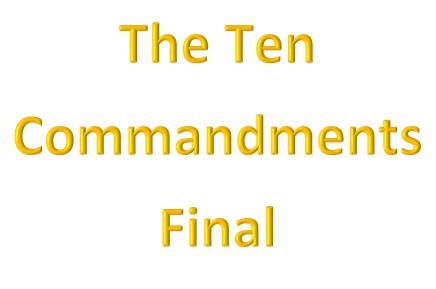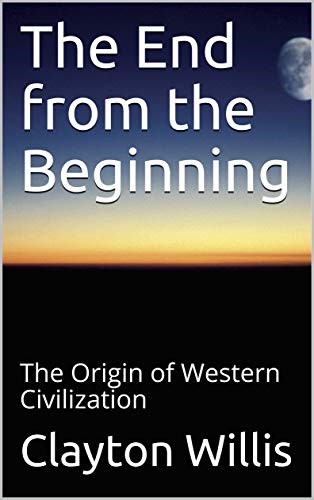The Ten Commandments Final

For the many thousands of Facebook users who read some parts of or all of my 10 essays on the Commandments and often shared them on your own timeline – my heartfelt “THANK YOU!” The hundreds of “Amens”, words of encouragement, compliments and comments were each read and deeply appreciated.
According to the understanding God has given me, here are some points I wanted to share with you:
The Ten Commandments are recorded in the Book of Exodus, chapter 20, verses 2 – 17 and Deuteronomy 5:1–22. The first 4 define our relationship with God; the other 6 define our relationship with each other.
Jesus summarized God’s perfect, eternal and immutable Laws.
37 Jesus replied: “‘Love the Lord your God with all your heart and with all your soul and with all your mind.’ 38 This is the first and greatest commandment. 39 And the second is like it: ‘Love your neighbor as yourself.’ 40 All the Law and the Prophets hang on these two commandments.” Matthew 22:37–40; Mark 12:29-31 (NIV84)
Jesus also taught us how to expand the Ten Commandments so that we could see that they cover every aspect of our lives: hate = murder; lust = adultery, etc.
Jesus often referred specifically to the Ten Commandments: Matthew 5:19; 15:3; 22:36; Mark 7:8; 12:28; Luke 18:20; John 14:15 et al.
The Word was with God and was God from the beginning; the Word became flesh as Jesus [John 1:1,2,14]. Therefore we can state that Jesus spoke and then wrote the 10 Commandments in stone. He said,
15 If ye love me, keep my commandments. John 14:15 (KJV 1900)
Sometimes, Christians have a difficult time when someone asks, “What is sin?” As Paul wrote to the church in Rome:
7 What shall we say, then? Is the law sin? Certainly not! Indeed I would not have known what sin was except through the law. For I would not have known what coveting really was if the law had not said, “Do not covet.” Romans 7:7 (NIV84)
The Ten Commandments define sin, and each is individual and personal to each of God’s people. Obeying them is an individual responsibility.
The Ten Commandments provide no instruction for human religious organizations or groups and there are no rituals mentioned or described.
God spoke these Commandments in His own voice to the children of Israel and wrote them on stone tablets. These are the only laws in the Bible that were spoken in God’s own voice other than His speaking to Moses and to other leaders of Israel. After Israel abandoned God and wanted a human king, God spoke only to the prophets.
Moses and his scribes recorded them when he wrote the Torah and thus preserved them for all the people of the world.
The other laws, rituals, rules and ordinances in the Torah were given THROUGH Moses and were “added” because of the Israelites’ sinful nature. They were necessary to bring Israel and mankind through the centuries until the time of Jesus [Galatians chapter 3]. They are all part of the “Old Covenant” (Old Testament) and have no authority over God’s people under the “New Covenant” Jesus put into effect with His death on the stake.
The study of the Torah is highly worthwhile because we can learn more of what God expects of us as well as learning the many things He did to teach the Israelites and to improve the lives of the former slaves (in Egypt) while they were on their way to the “promised land”.
The same holds true for the books of prophecy and history as well as the books of wisdom and philosophy.
There is no mandate in the 4th Commandment to assemble on the Sabbath; that tradition was established in the “law of Moses”. The tradition of assembling on Sunday was established by what became the hierarchy of the Catholic Church and is without Biblical foundation. God’s people, under the New Covenant, are not BOUND by either tradition.
No man has the right to amend, alter, re-define or otherwise change God’s Commandments.
According to my understanding, anyone who teaches that the 10 Commandments “no longer apply” or are “done away with” does not truly understand the teaching of the Bible or God’s plan of salvation for mankind and should not be counted as qualified to be a Bible teacher or a preacher, priest, elder or deacon in God’s church that Jesus established.
The fact that we can never keep the Commandments perfectly is no excuse for not striving with all our might to do so.
Instead, as we strive to live by God’s laws, we humbly ask God to forgive our sin and strengthen our faith so that – like Abraham [Genesis 15:6] and many of God’s people in the Scriptures – He will “count that faith as righteousness” (which means, “in compliance with God’s laws”).
33 “This is the covenant I will make with the house of Israel after that time,” declares the Lord. “I will put my law in their minds and write it on their hearts. I will be their God, and they will be my people. 34 No longer will a man teach his neighbor, or a man his brother, saying, ‘Know the Lord,’ because they will all know me, from the least of them to the greatest,” declares the Lord. “For I will forgive their wickedness and will remember their sins no more.” Jeremiah 31:33–34 (NIV84) quoted in Hebrews 10:15–18

